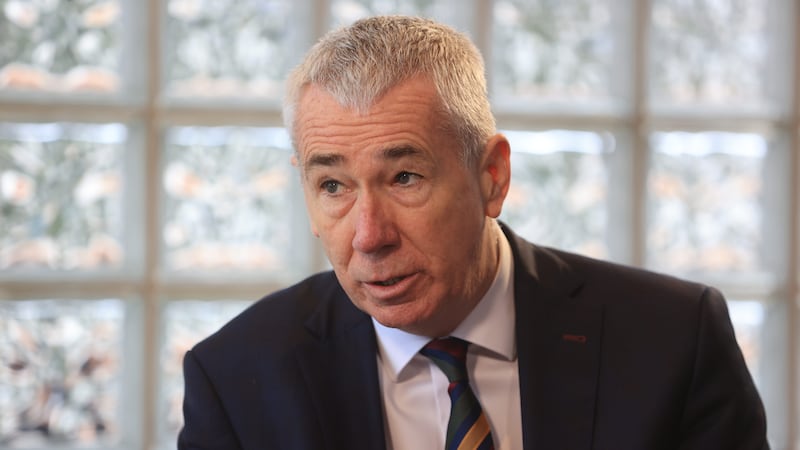The current uncertainty surrounding the future of the Kilroot and Ballylumford power stations exposes a serious flaw in the energy security policy for Northern Ireland, and is something that was not foreseen when Northern Ireland signed up to an all-island energy market.
When the Ulster Unionist Party led the first periods of devolution nearly 20 years ago, one of our priority areas was to increase competition in our energy sector and ensure Northern Ireland had adequate reserves of electricity generation available to it. Accordingly, the then DETI minister Sir Reg Empey (with the support of the executive) wisely issued a ministerial direction to enable the expansion of the natural gas network to other areas of the province, and in particular to Londonderry to facilitate the operation of a new gas-fired station at Coolkeeragh. The ministerial direction was required because of opposition from the NI Civil Service. Shortly thereafter we encouraged the mutualisation of the Moyle electricity interconnector, and later the gas interconnecter. These measures assisted in providing alternative generation options for NI customers and started to break the disastrous availability contracts which had been put in place during direct rule and resulted in us having the most expensive electricity in western Europe.
Since then, the entire Northern Ireland transmission and distribution assets have been acquired de facto by the Irish government; a situation which many believe to be anti-competitive and injurious to Northern Ireland. If Kilroot and Ballylumford stations are allowed to flounder, competition will be further depleted and we run the risk of returning to the bad old days of energy insecurity. Add to this the ridiculous notion of building a new mega power plant on the Belfast harbour estate – the most expensive commercial real estate in Northern Ireland, and the NI consumer will end up paying for new energy infrastructure, new transmission and distribution networks, and the costly decommissioning of two existing power stations which could still have a considerable working life ahead of them.
A key component of energy security is to have a multiplicity of feed stocks. We have a good wind network now, but wind energy is sporadic and cannot be stored. To depend largely on gas exposes us to the dominance of Russian and Middle Eastern suppliers. Coal power may be unfashionable but it provides us with an alternative that should be retained in the national interest.
Many other European governments have prevented the closure of their coal stations, including the environmentally conscious German government. We should allow the closure of Kilroot at our peril.
DAVID CAMPBELL
Former UUP Chairman,
Lisburn, Co Antrim
People should judge a citizens’ assembly only on its results
The Building Change Trust last week announced funding for a Citizens’ Assembly pilot in Northern Ireland this year. We very much welcome the debate in the media about this initiative in recent days. It is understandable that there is some scepticism. However, we would like to address some of the criticisms made by Tom Kelly in his article (January 22).
Underpinning much of the criticism and commentary seems to be a belief that democracy equals elections and vice versa. Elections are only one aspect of democracy, albeit a crucial one. They are a mechanism by which we seek to ascertain the ‘will of the people’. However, they are an imperfect mechanism in terms of engaging the public in any detailed consideration of the many complex issues we face.
We know all too well that in Northern Ireland, elections are fought and won on identity politics – more complex policy issues rarely get a look in. This was evident in the Brexit referendum, where the results didn’t correspond with party positions on the matter.
A second related belief seems to be that ordinary people are incapable of dealing with complex challenges. There’s an instance where we already entrust randomly selected members of the public to deliberate and decide on crucial and complex matters. It’s called jury service. Would holders of this belief support abolition of the jury system? I doubt it. A citizens’ assembly uses a not dissimilar process to find solutions to political and policy issues. Evidence from the Irish Citizens’ Assembly, and its forerunner the Irish Constitutional Convention, would suggest citizens are more than up to this task.
Finally – to the accusation that a Citizens’ Assembly would amount to nothing more than a ‘boring talking shop’. If Tom Kelly can answer how we might resolve any of our complex challenges without talking about them I would be very surprised. While the pilot Citizens’ Assembly would have no official powers to begin with, it is worth bearing in mind that this was how the Irish imitative started in 2011. The independent “We The Citizens” initiative laid the ground for the two statutory citizens’ assemblies that have followed. So we think this model deserves a fair hearing. We ask only that people judge it on its results.
PAUL BRAITHWAITE
Building Change Trust Belfast BT12
Serious questions for Sinn Féin on issue of abortion
Since the Sinn Féin Ard Fheis, your columns have featured numerous letters on the subject of the proposed liberalisation of abortion throughout Ireland. But, unless I have missed it, there hasn’t been a single contribution to the debate from anyone in Sinn Féin. This begs a number of questions to the Sinn Féin membership. Do you all agree with the policy change?
If so, please tell us, the voters. If not; again, please tell us. It really matters to a lot of us what you think.
We are concerned that there may be people in Sinn Féin who do not agree with the policy, but for some reason are reluctant to say so.
Has there been a decision in the party not to speak publicly on the matter?
Have you been assured that it will all blow over and no-one will notice your silence?
Have you been told that breaking ranks on the matter will endanger the quest for power north and south? Or have you all given up on the part of the Proclamation which promised to cherish all of the children of the nation equally?
The voters, particularly the Catholic voters of west Tyrone, will need to know soon.
PAT McMAHON
Newry, Co Down
Reflect the will of the people
It is with disappointment that I heard the new secretary of state Karen Bradley say that she will not ‘impose’ equal marriage in Northern Ireland.
She needs to revisit her use of the term ‘impose’. Poll after poll clearly shows that an ever increasing number of people support the introduction of equal marriage. The most recent Ipsos Mori Poll in July 2015 stated that 68 per cent of people are in favour of a change to the law.
This debate first came to prominence in 2012 when the Green Party leader Steven Agnew brought the first ever LGBTQ motion to the assembly, a motion in favour of equal marriage. This was narrowly defeated by five votes because Alliance and SDLP couldn’t get their MLAs to follow their own party policies. These parties place their MLAs’ own personal religious views ahead of equality and minimum human rights standards. After four more repeated debacles from these parties, we finally achieved a slim majority in November 2015.
Since then the political momentum has continued to grow in favour of equal marriage.
I am proud that the Green Party is the only party with a 100 per cent record of support for equal marriage.
We are asking the secretary of state to reflect the will of the people and end the DUP’s imposition of their views on everyone else.
MALACHAI O'HARA
Green Party, North Belfast







